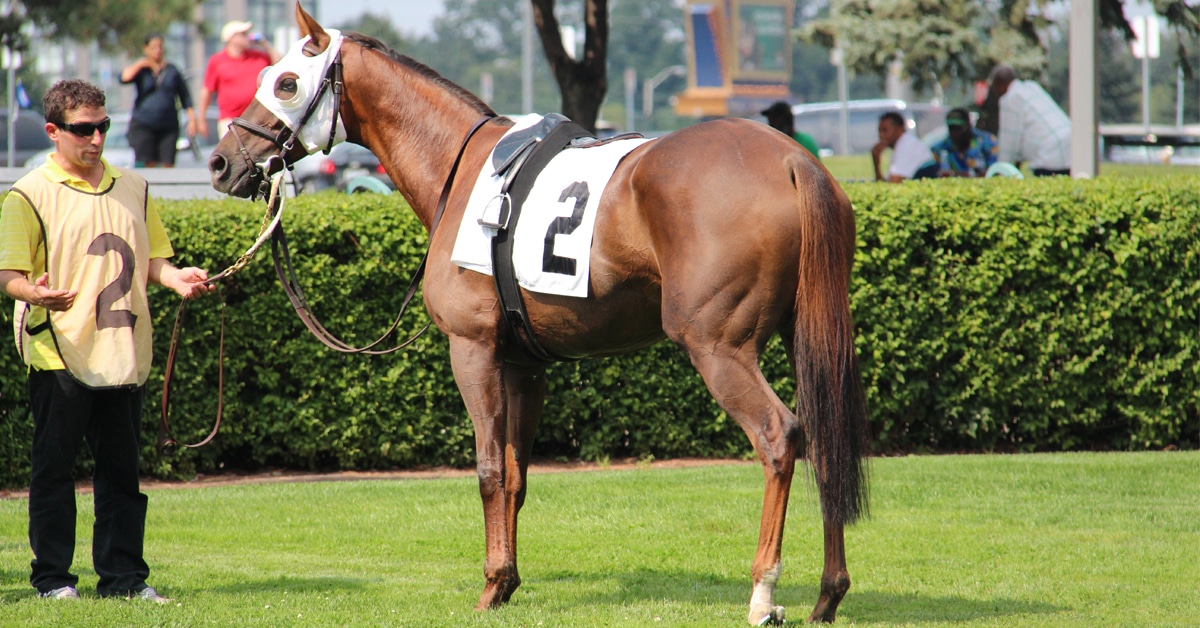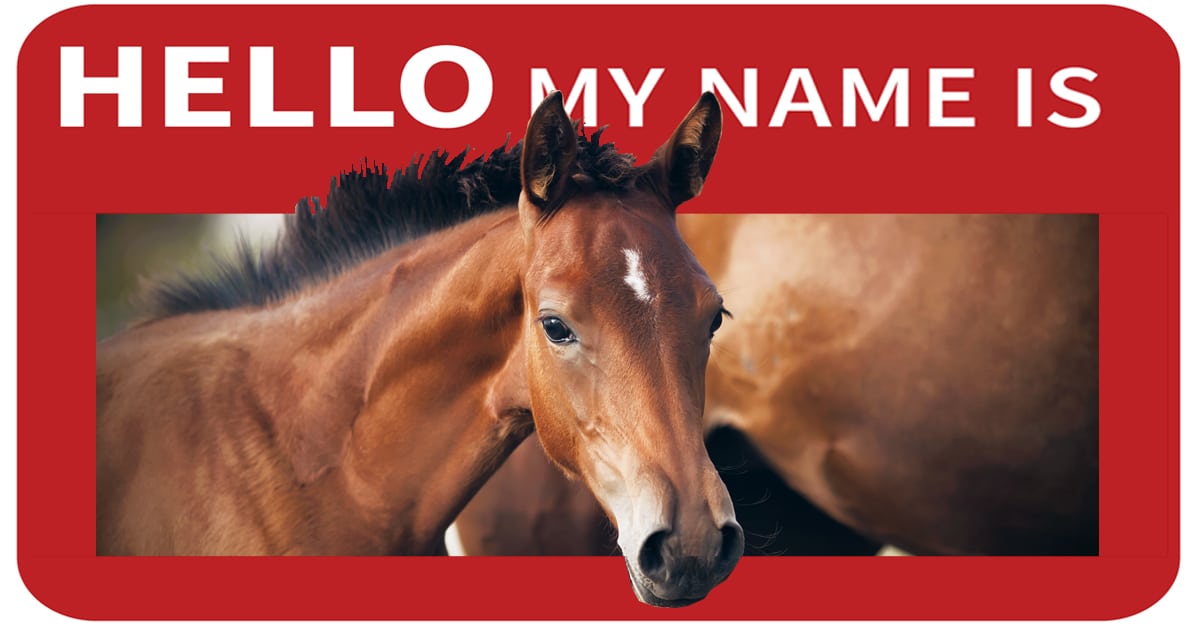On January 1st, all Thoroughbreds in the northern hemisphere turn a year older. One such Thoroughbred is a grey filly owned by Sarah Ritchie, a trainer at Woodbine Racetrack. Not only did Ritchie’s filly turn two years old, but four days into the new year she was also officially given her racing name, Anam Cara, which had been approved by The Jockey Club.

Anam Cara and Gator Kitten: “Can’t wait to see her run in the Kitten’s silks,” says Sarah Richie. (S. Richie photos)
Ritchie, whose trainees include the graded stakes-placed mare November Fog, announced on social media that Anam Cara, a Celtic phrase meaning ‘soul friend’, was approved seven years to the day of Gator Kitten’s “gotcha day.” The name was in honour of the furry little legend on Woodbine’s backstretch who commanded the shedrow and even had a huge following on Twitter @GatorKitten.
Family lineage can often provide the needed inspiration for a racing name. For example, Canadian stakes champ Rideforthecause is a daughter of Candy Ride, out of the dam Danceforthecause. Town Cruise is a son of Town Prize, out of the dam Candy Cruise.
Even COVID-19, which was declared a pandemic on March 11, 2020, lent itself to the naming process. Pandemic Cat and Pandemic Girl are both registered names for Thoroughbreds foaled in 2020. While pre-dating the Coronavirus outbreak, it’s interesting (and prophetic?) to note that a six-year-old Oklahoma-bred mare is named Omicron!
While the source of inspiration may differ for each Thoroughbred’s racing name, every name must still be approved by The Jockey Club, the breed registry for Thoroughbred racehorses that are foaled in the United States, Canada, and Puerto Rico. Across the pond, the British Horseracing Authority (BHA) oversees the naming process. The Registrar of Racehorses (part of Racing Australia) maintains registering and the naming of Thoroughbreds down under, and so on.
Naming by the Numbers
According to Shannon Luce, the Director of Communications for The Jockey Club, in 2020 there were 19,891 horses named. Additionally, there were 678 horses with a name change, bringing the total names registered in 2020 to 20,569. In 2021, there were 19,200 horses named and 664 undergoing a name change, bringing the total to 19,864 names registered with TJC.
In a TJC news release from last fall, the projected North American foal crop was estimated at 18,700 for 2022.
Choosing a Name
If lineage or personality or the weather on foaling day doesn’t provide enough inspiration to choose a suitable name, The Jockey Club’s list of recently ‘released’ names can provide a starting point. On December 22, 2021, The Jockey Club released over 29,000 previously claimed Thoroughbred names which can now be re-used.
A quick browse through the list reveals a few familiar names in Canadian racing. For example, Bear No Joke was a handsome grey gelding who won the 2013 Gr.II Kennedy Road Stakes at Woodbine. Despite being a very gritty racehorse, winning and placing in a handful of graded stakes, Bear No Joke’s achievements still fell short of being considered for a ‘permanent’ name (more about this later).
The Jockey Club’s Online Names Book is another avenue to pursue if you want to know which names are presently used, reserved, or considered permanent. You can now claim, change or reserve a name using The Jockey Club’s handy naming app.

Stolonboy was owned and trained by the late Joe and Carol Walls. Although the gelding posted 90 career starts from 2007-2016 at Woodbine, since he’s been retired for over five years and did not secure any awards or achievements to bar his name from further use, it can be scooped up for a future iron horse in the making. (Hayley Morrison photo)
Naming Procedures
The Jockey Club maintains the American Stud Book, which outlines the specific guidelines for naming a thoroughbred racehorse, as well as the rules and requirements for foal registration, transfer of ownership, export and import certificates, and live foal reports – to name a few elements of the book.
When a foal is born, a name must be decided upon at some point before they enter into the racing world. Like babies with birth certificates, foals have JC certificates providing details of their family lineage. The racing name (or the JC name) must be submitted to The Jockey Club by February 1st of the horse’s two-year-old year to avoid a fee. After February 1, you are charged $100 fee to claim a name for your racehorse.
If you have doubts about the name choice, the rules in the American Stud Book state that “a foal’s name may be changed at any time prior to starting in its first race.” Once the horse leaves the starting gate, the name stays with it for the rest of its racing career…
The non-starter list of ineligible names
…except that’s not always the case. For example, copyright infringement can result in a horse needing a new name. Such was the case with Fozzie Bear, trained by Tino Attard in the mid-1980s. The Woodbine stakes champ’s name was changed to Bold Revenue due to a potential lawsuit initiated because Fozzie Bear was the name of one of the characters on The Muppet Show. Tino’s son, trainer Kevin Attard, said in a 2019 interview with Ontario Racing that watching Fozzie Bear race as a kid inspired him to become a trainer.
Where a name change must be initiated, The Jockey Club states that both the old and new name must be used in at least three starts following that name change. A name change will cost $125, according to The Jockey Club’s fee schedule; if you want to a reserve a name ahead of time, it will cost $100.
Name length is also a consideration. As stated in the Stud Book, a name cannot be longer than 18 letters (you’re welcome, race callers). There are a few that come close to or hit that mark. At Woodbine, for example, there was a horse with the tongue-twisting name of Medidocihospisurg who won the 2011 Elgin Stakes and was trained by Steven Chircop. Another familiar face that ran several times at Fort Erie this season was Justintimegosnorth, an chestnut gelding trained by Sharon Ceccato. And then there’s Catsthankmuyihidin who was running at Remington Park last season, or Yakahickamickadola who raced at Hialeah in the ’80s.
A racing name cannot consist of abbreviations, be fully comprised of numbers, or end with a numerical designation such as 2nd or 3rd. You cannot use the name of a living person, such as Doug Ford, unless written permission is received by The Jockey Club. A racehorse cannot be named after a deceased person unless written permission is established. TJC will not condone any names that could be considered “offensive to religious, political, or ethnic groups.”
Occasionally, a risqué name seems to slip through the cracks. Take for instance Hoof Hearted, Geespot, Bofa Deez Nuts, Wear The Fox Hat (say it quickly with an Irish accent), and Bodacious Tatas.
Some are just clever, like Maythehorsebewithu, Covfefe (think Trump tweet), Fiftyshadesofhay, Flat Fleet Feet (say that fast five times), Horsey McHorseface, Onoitsmymothernlaw, or Mywifenosevrything and Thewifedoesntknow, who raced against each other in 2010. And there is likely a good story behind Split My Pants, Pants On Fire and Who Has My Pants.
While it may seem obvious, future racehorses cannot be named after a horse that is currently racing or that is active in the breeding industry. That means The Minkster, who won the 2021 Coronation Futurity, is the only horse running under that name. Likewise, there cannot be another Amalfi Coast, multiple stakes-winning daughter of Tapizar who recently retired from racing and is off to become a broodmare.
Permanent names
Generally speaking, once a horse has been retired from racing or breeding for five years, the name will become eligible for use again. Again, there’s a caveat: the name will not be eligible for use if that specific horse secured any racing or breeders awards, which in turn would make the name permanent by TJC standards. Case in point would be a broodmare named Loving Vindication who produced 2018 Queen’s Plate champ Wonder Gadot as well as U.S. stakes winner Hard Not To Love. Loving Vindication received the 2019 Sovereign Award for Outstanding Broodmare.
According to guidelines in the American Stud Book, a permanent name is established if a horse has been entered into racing’s Halls of Fame, has been voted Horse of the Year, or taken home an Eclipse Award or a Sovereign Award. Additionally, the name of a runner that banked $2 million or more will retire with the athlete. Horses that secured a win in the Kentucky Derby, Preakness, Belmont Stakes, Jockey Club Gold Cup, or the Breeders’ Cup Classic are also considered permanent names.
It should come as no surprise that Pink Lloyd, after securing seven Sovereign Awards over his storied five-year racing campaign, is a permanent name. Additionally, the one-eyed wonder Mighty Heart has also cemented his name in Canadian racing history. The 2020 Queen’s Plate winner clinched the 2020 Horse of the Year title as well as the champion three-year-old colt award. Likewise, Curlin’s Voyage took home Sovereign Awards in 2019 and 2020 for champion two-year-old and then champion three-year-old filly.
That is also the reason you don’t see the names of certain U.S. and Canadian racing champs such as Secretariat, Seabiscuit, Not Bourbon, or Wando up for grabs again. Each champ’s name is designated with a (P) at the end of their name in the online names book which indicates it is permanent.
There is almost always a unique and interesting story behind every racing Thoroughbred’s name. It’s satisfying to know that choosing a name can allow friends, family, and even a beloved feline to be part of the horse’s journey and legacy.


